#roughly translates to
Explore tagged Tumblr posts
Note
∞ 🫵🏻
Yo era tu vaso cuando tenias sed
Como en la mañana yo era tu café
Yo era una abeja y tú eras mi miel
Conectamos bien, te lo juro, bebé
#shit my b the song that came up was a Spanish one but I didn’t want to cheat by picking another song 😅#roughly translates to#I was your cup when you were thirsty Just like in the morning I was your coffee#I was a bee and you were my honey We clicked well I swear baby#it’s sad but it’s a banger I promise 🥹
3 notes
·
View notes
Text





NESTFEST DAY 2 – mark crying + penguin huddle
#i dont feel so good#yjs comment roughly translates to we're proud of you but literal its you're so commendable/lovable/praiseworthy important nuance to ME!!!#got7#got7edit#mark tuan#bambam#yugyeom#youngjae#ahganet#emily look#*#not svt
1K notes
·
View notes
Text

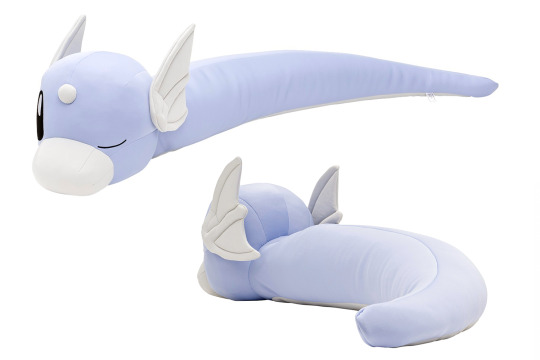

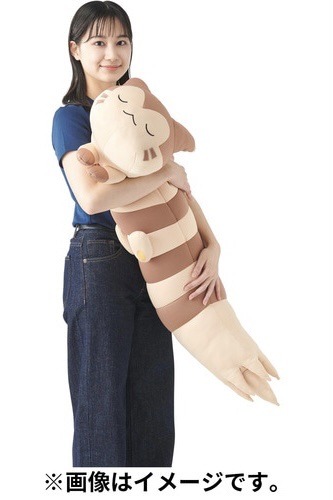

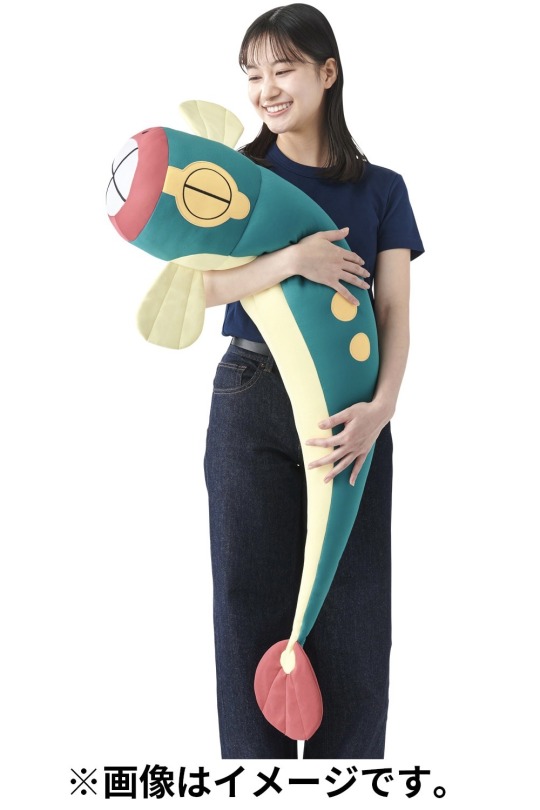
pokemon center japan ✨ ぎゅっと抱くっしょん (hug me tightly)
#roughly translates to hug tightly/tight hug or cuddle#can’t find official english name for the line#dratini#eelektrik#furret#pokemon#pokémon#plush#plushcore#toycore#plushies#plushie#plushblr#pokemon center japan#pokemon center
4K notes
·
View notes
Text
Thinking about Odysseus and how his character is interpreted and seen throughout history. How in every culture and time period he seems to change and transform based on cultural opinions. How for Homer he was a hero that suffered much, how in most of Euripides' plays he's a bad guy, and for some Roman authors he was horrible, his worse qualities heightened. And then there's the modern reception, where some of his worse traits are completely removed to make him more palatable to a modern audience that is not very familiar with the myths.
Think about epic the musical, how at first he is merciful and then changes. In the Odyssey he's totally different, he's ruthless since the beginning. The total switch in the perception of his character is truly fascinating! In fanon he's funny, he's a silly little guy, he's a little bastard and we love him for that. In canon he's a war criminal that damned an entire city for the riches, for the glory, for the wish of coming back home to his family.
I'm not here to criticize modern takes of him ( I reserve the blorbo tratement for him too), I just find it truly interesting how much he has changed in the eyes of the audience, how much he's still relevant after the Bronze Age. There's not just one Odysseus and he's not simply a soldier that wanted kleos, he's not simply a man that suffered much, he's not simply a man that just wanted to go home. He's all of these things and a lot more.
He's the man of many twistes and turns indeed.
#odysseus#the iliad#the odyssey#epic the musical#analysis#Also fun fact#Polutropon in the most used translation of the odyssey in my language translates roughly to “which intellect takes many forms”#I like him a normal amount#Also sorry I know that there's other people that explained this better than me but I had to talk about this
270 notes
·
View notes
Text

mammmmmmmmmmmon with that doggo meme going around twitter
#translation roughly says that the dog's eyebrows are furrow almost like theyre angry#but actually theyre not angry#i cant find the actual eng ver so take my poor chinese translate with a grain of salt#obey me#obey me nightbringer#obey me mammon#obey me fanart#riddle doodle#mammon is a puppy wheeze#i havent done this style in a while bc it takes a lot of time fjdshfds but i miss soft looking mammon
653 notes
·
View notes
Text
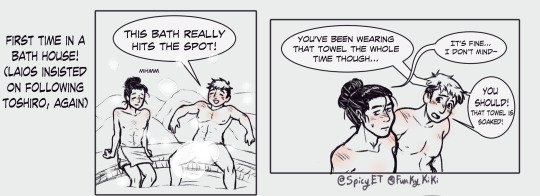

Sometimes I think about how different they are-- maybe they do too.
#laishuro#dungeon meshi#nakamoto toshiro#toshiro nakamoto#shuro#shuro dungeon meshi#laios touden#art#Laios doesn't know all the bathhouse rules and he don't care for em if he did#have you guys noticed that toshiro has a super rare but desirable samurai physique?#he's tall and grows some stubble#strong but not muscular#also the name Toshiro roughly translates to 'handsome'#what I'm trying to say is that Laios is right to simp for him as much as he has been <3#Sam's doodles of the day
489 notes
·
View notes
Text
WARDI TERMS OF ENDEARMENT
emense [ɛmɛnse] (eh-mehn-say)
Has meaning close to 'beloved' or 'darling'. "Ya emense" (meaning 'my beloved'/'my darling') is often contracted "y'mense".
bubuch [bubuk] (boo-bookh)
Somewhat of a nonsense word, basically ‘big-big’. Tends to either be used for small children or flirtatiously between adults (kind in between 'baby' and 'big boy' in functionality, though without gendered implications of the latter). Sometimes instead used as a form of intense condescension.
ya mache mes [ja mɑke mes] (yah mah-kay mace)
Functionally means "my other face", using the figurative word for face describing a concept of fundamental nature rather than anatomy. Very intense term of endearment, expresses the recipient as a core part of one's identity. Kind of equivalent to 'my other half' but not exclusively romantic.
ya tsitsima [ja ͡tsi͡tsimə] (yah tsee-tsee-muh)
Means "my blood". This term is used more broadly to denote familial relations, and is more of a term of endearment when used outside of actual biological relationship (calling your sister 'my blood' is just an intense way of saying 'my [relative]', calling a non-relative 'my blood' is VERY pointedly affectionate).
ya ungande [ja ungɑnde] (yah oon-gahn-day)
Often contracted to y'ungande, dead literally means "my liver" as in the organ. Ungande alone is also used as a food-based term of endearment, similar to 'honey' except instead with delicious organ meat.
anuje [ɑnudʒe] (ah-noo-jay)
Food based term of endearment, referring to a tree sap that is the most commonly used form of sweetener. Functionally identical to 'honey' in usage.
anu tlansekoma [ɑnu tlɑnsekoʊmə] (ah-noo tlahn-say-koh-muh)
This one actually means 'honey' (dead literally 'bee sweet'). Less common than 'anuje' as a term of endearment due to general cultural preference for anuje as a sweetener and the relative rarity of beekeeping.
inyagit [injəgit] (een-yah-geet)
Diminutive form of 'sun'. 'Ya inya' (my sun) occurs as well, but is less common.
y'mit agai [j'mit ɑgaɪ] (yuh-meet ah-gai)
Contraction of 'ya amit agai', 'my blue moon'. This specification is more common than a general 'my moon(s)' and is fairly loaded, given this particular moon is the site of the afterlife for the most honored dead. The phrase both suggests a sort of celestial beauty and a sense of being honored and finding rest in the recipient. This is a VERY intense and almost exclusively romantic term of endearment.
coutomara [koʊtoʊmɑrə] (koh-to-mahr-uh)
Means 'handsome' or 'beautiful', implies masculine attractiveness. (Dead literally closer to 'strong face'/'strong featured').
jaimara [dʒaɪmɑrə] (jaim-mahr-uh)
Means 'pretty' or 'beautiful', implies feminine attractiveness (dead literally close to 'beautiful face'/'beautifully featured').
katsuy [kɑtsui] [kaht-soo'ee]
Sexually charged description of physical attractiveness, basically calling someone 'sexy'.
ya katsuymen [ja kɑtsuimɛn] (yah koht-soo'ee-mehn)
Related and also sexually charged, close in meaning to 'my desire'.
at akmatse yachouy [ɑt ɑkmɑtse jɑtʃɔɪ] (aht ahk-mat-say yah-choi )
Sexually explicit term of endearment. The dead literal translation is "one who makes me flower". The word "flower" here is not as euphemistic in context and is rather the nicest sounding possible way to say "makes me cum (HARD)". Not considered vulgar, rather cloyingly romantic if anything.
gan(ne) ama [gɑn(e) ɑmə] (gah(-nay) ahm-uh)
Means 'bull'. When used affectionately, implies masculine strength. Usually used in conjunction with an adjective (ie 'handsome bull') or more teasingly gannit ama (little/baby bull))
jaimeti [dʒaɪmɛti] (jai-meh-tee)
Means 'gazelle' (the name for the animal itself is close in meaning to 'beautiful horn'), heavily associated with grace and beauty. Also tends to be used with adjectives ('lovely gazelle' 'handsome gazelle' etc) or with a diminutive.
ansiba [ɑnsibɑ] (ahn-see-bah) or ansibit [ɑnsibit] (ahn-see-beet)
Means 'duck' and 'duckling' respectively, specifically refers to the animal and implies cuteness. Ansibit is a very common term of endearment for children.
"Wannaukoma such datse anmo" [wɑnaʊkoʊmə suk dɑtse ɑnmoʊ] (wahn-now-koh-muh sookh daht-say ahn-moh)
Means 'an ant could swallow you', implies cuteness (ie the recipient is so small and tiny an Ant could devour them whole). Usually used on children, occasionally used on adult women (in a way that feels intensely patronizing to many). 'Datse' (you) may be replaced by the recipients surname or honorific in the rare case that someone would dare calling someone this without being on first name basis with them.
wannaukomit [wɑnaʊkoʊmit] (wahn-now-koh-meet)
Means 'little ant', a term of endearment that borders on insulting even to babies.
OTHER:
-it [it] (eet)
This is a diminutive modifier, which can be added to a name or other word/term of endearment to denote affection (can also be condescending). It lacks internal meaning in everyday use and is closer to the English -y or -ie (billy johnny rosie susie puppy kitty ducky etc).
hippe [hipɛ] (heep-peh) (some dialects drop the h sound entirely)
Means 'small' or 'little', can be spoken with other words/names as an affectionate diminutive.
Other epithets-
Various epithets used in the language are not exclusively used as terms of endearment, but can be contextually. Most commonly, this will be the -machen epithet of the recipients zodiac birthsign (particularly those considered auspicious). Someone with the lion birthsign could be respectfully and/or affectionately called 'odomachen', or VERY affectionately called 'ya odo' ('my lion'). There's also a good variety of poetic epithets that have worked their way into common language as affectionate compliments/descriptors- ie ganatoche (dead literally 'cow-eye', more prettily 'ox-eyed') is a complimentary descriptor for brown eyes, anaemaitsa (dead literally 'river-haired', more prettily 'flowing-haired') compliments wavy hair.
Given name basis-
In Wardi culture, full names are spoken with the family name preceding the given name. When respectfully speaking to a stranger, peer, or authority figure, you refer to them by their family name, title, and/or an honorific. Being on an accepted given name basis with someone is generally indicative of closeness and affection.
datse [dɑtse] (dah-tsay)
This is the word for "you". Similarly to the use of a given name, actually referring to someone as 'you' (rather than a surname, title, or honorific in place of the pronoun) expresses familiarity and intimacy.
#FUCK I LEFT A HUGE ERROR IN THERE OVERNIGHT . Okay#Even longer Wardi insult/vulgarity post coming someday#I can't actually put a lot of the linguistic Nuance in the writing because it doesn't 'translate' well in english. Especially the avoidance#of 'you' pronouns between unfamiliar company. Translating it ranges from mildly clunky to borderline unreadable#(Ie if you're asking a stranger's name in Wardi you'd use an honorific that is roughly equivalent to sir/ma'am if you're being#deferential or 'mister/miss' if not. 'What is mister's name?' sounds weird as fuck in english)#I could just include the in-universe honorifics instead which would avoid that but I'm really trying to avoid loading the text with#constructed language where it's not really necessary. I mean I'm not writing this to be a mega-approachable mass appeal story but#having to memorize a bunch of constructed terms can be a pain in the ass as a reader#(like there's still a lot in there but it's mostly 'untranslatable' words or very specific concepts)#And ultimately just saying 'you' and dropping the nuance of how 'you' is insulting when not used in close company is more efficient#I do have the last name/first name basis distinction in there textually though. A lot of the characters refer to each other#exclusively by surname
99 notes
·
View notes
Text






― José Hernández, Martín Fierro
#Arcane#Caitlyn#Jinx#Vi#Viktor#Jayce#Ambessa#one of my favorite poems/quotes#and I thought it fit the thematic#so I translated it (very roughly)#Piltover#Zaun#Noxus
244 notes
·
View notes
Text

tête sur les talons 🤍💜🖤
#dragon age veilguard#dragon age the veilguard#lucanis dellamorte#rookanis#lucanis x rook#digital illustration#i know there are other ways to say it BUT translation roughly meaning the same as head over heels because gay :)
97 notes
·
View notes
Text

I MISSED THIS MF I MISSED HIM AND HIS PATHETIC FRENCH ASS I CAN'T WAIT TO SEE YOU BEING MISERABLE (i love him so much) (also yes, I play in french because I can ✨)
#assassin's creed#assassin's creed unity#ass creed#koi ac journey#I don't know if I need to translate all the subtitles btw#i mean it's roughly Arno being a sarcastic brat#>> forgive him he's french 😔
36 notes
·
View notes
Text
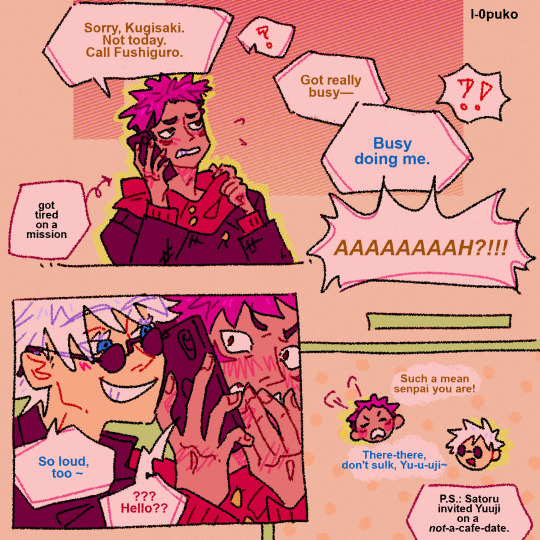
the sillies // senpai-kouhai AU
#JJK#Jujutsu Kaisen#5u#GoYuu#senpai kouhai AU#Itadori Yuuji#Gojo Satoru#Kugisaki Nobara#(mentioned)#my art#suggestive themes#(just in case)#the joke that started it was (roughly translated) 'the work stuff is down my throat* (meaning too much work)' - 'the stuff is me'#but the thing is the right expression is 'the work is up to my ears (=too much work)'#Satoru takes it as a chance to mock (affectionately) that one dude he's got a crush on#the clownery#i just think Yuuji mixing up expressions so they sound questionable and Satoru following up with innuendos is a hilarious concept#i wish i could save the original meaning but this works too
668 notes
·
View notes
Note
Do you truly believe that men generally are physically superior in action to women in *every way*?
You don’t believe there is any physical activity in which women have an advantage?
It’s not about belief, it’s about biological fact. Women have a proven advantage in pain tolerance, and that is pretty much it. Unless you count growing human beings as a physical activity (which I do, but most modern people do not, and I think that’s one reason women’s health across the board is so shot—we do not respect the fact that our whole constitution revolves around this singular activity, whether or not we actually intend to have a baby).
Women were not designed to perform the most physically demanding roles in human society. They were designed to nurture, educate, advise, and in so doing, civilize. They deserve to have their own athletic spheres, to achieve physical prowess within their own parameters. Not those of mankind’s soldiers and laborers.
#respublica#mobile#x#science#just because women don’t excel in *action* doesn’t mean they don’t excel in other areas#we have much better sense of smell than men do#the difference between humans’ smell and dogs’ smell? roughly equivalent to the difference between men’s smell and women’s smell#that’s not an advantage that translates to sport because it’s designed to detect both a child’s needs and dangers to a household#but it’s still an advantage#when we talk about the shrimp who see in extra colors we don’t complain that they are shrimpy
34 notes
·
View notes
Text
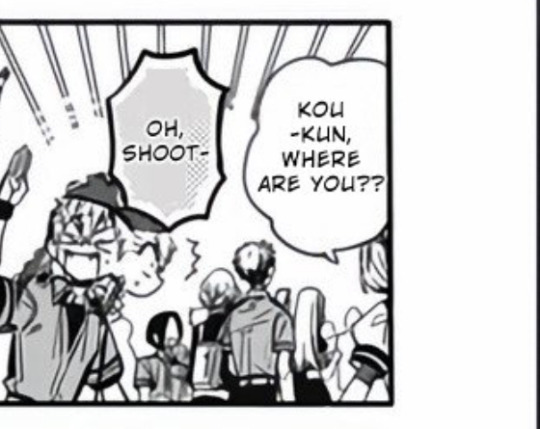

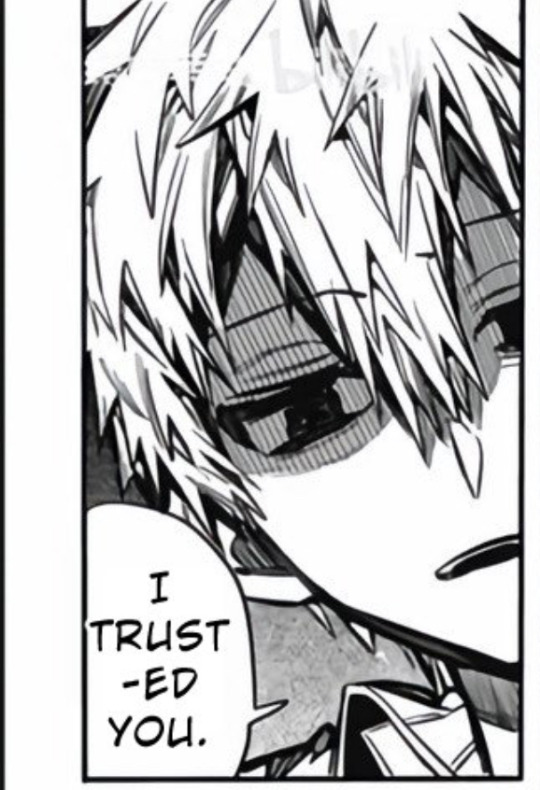

oh ok.
#for context the left side are raw translations and the right side are official translations#but man teru saying he trusted akane was character development#and the betrayal he felt oh wow#and then mitsukou on first name basis instead of surname#roughly the raws translate to minamoto but still#mitsukou#terukane#tbhk#jshk#toilet bound hanako kun
276 notes
·
View notes
Text

Why dis 🧝🏾 look so mad 😭😭😭 --
POV: you're Rook and the Inquisitor brought his friend, the ex of Solas — the guy you oopsie'd into the fade — to the Lighthouse
#Dragon Age#Dragon Age: the Veilguard#Cerill Lavellan#Andros Lavellan#Inquisitor Lavellan#to whom ever ends up as our canon Rook#you are in So. Much. Trouble.#Rook's next conference call with Solas is gonna be mostly incoherent histerical screeching roughly translating to#'you left HER on read?! For 10 Years?! HER?!! Are you WISE?!!'
94 notes
·
View notes
Text


one of the chibi comics from the zenigata file
#poorly scanned and untranslated for your viewing pleasure#i put little sticky notes in my copy to roughly translate what they're saying but. it didnt feel right to scan that.#just looking bad and probably only 50% accurate anyway.#and chibi zeni deserves better than that#lupin iii#zenigata#cherry talk
22 notes
·
View notes
Text
Yelena, using air quotes: “Be the bigger person” I’m 160 cm, give me the gun bitch
#tbolts incorrect quotes#marvel incorrect quotes#yelena belova#for translation: 160 cm = roughly 5’2
20 notes
·
View notes